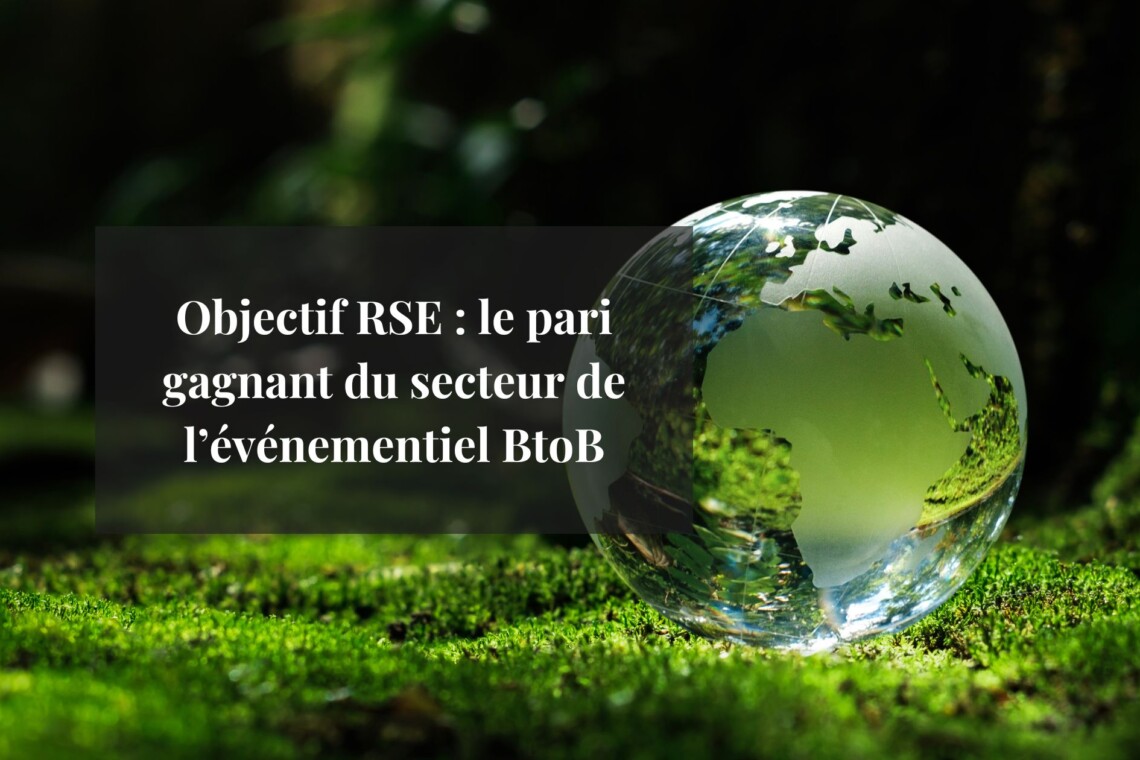Votre cocktail B2B en version XXL dans la capitale : impact maximum ?
- 9 juin 2025
- Evénementiel
Votre atout marketing business : un événement à impact maximal pour un budget minimal. La solution : un cocktail B2B en version... En savoir plus

RSE : Intégration volontaire, par les entreprises, de préoccupations sociales et environnementales à leurs activités commerciales et leurs relations avec les parties prenantes (source UE).
Cette définition technocratique de la Commission Européenne dissimule un océan de normes complexes, parfois difficiles à appliquer. Un certain flou règne et il convient de combiner une gestion réaliste des événements avec la mise en conformité des pratiques.
Pourtant, d’après une enquête du site Event Manager Blog, plus de 89 % des acteurs de l’événementiel considèrent que la RSE est importante, voire très importante pour leur entreprise.
Ces dernières années, les professionnels du marché BtoB ont su réagir avec brio à la nouvelle donne environnementale et sociétale, et parfois même, avec enthousiasme.
Quels étaient les enjeux de l’intégration de la RSE dans l’organisation événementielle de prestige ? Quelles réponses apporter aux défis de la transition en cours ? Quel bilan et quel futur pour une privatisation d’affaires toujours plus vertueuse ? Objectif RSE ? C’est le pari gagnant du secteur de l’événementiel BtoB !
Au cours des dernières années, la RSE s’est imposée à tous les acteurs de la société civile : entreprise, institutions, industries, secteur associatif… tous ont intégré, de façon plus ou moins volontaire, les critères RSE dans leurs opérations. Les experts de l’organisation événementielle de prestige se devaient d’évoluer, eux aussi, avec leur temps. L’enjeu : répondre aux exigences de clients professionnels qui transposent leur agenda en matière de RSE jusque dans le choix de leurs fournisseurs événementiels.
⏩ À lire aussi : Le secteur événementiel en 2024 : quels enjeux ?
0 % des donneurs d’ordre incluent des conditions RSE lorsqu’ils cherchent un lieu pour leur réunion BtoB (source : Green Événements). Les grandes entreprises ont donné le la, imposant aux acteurs de l’événementiel des cahiers des charges contraignants, avec parfois plus de soixante points à respecter :
Certes, les donneurs d’ordre répondent à des règlements toujours plus stricts imposés par les instances gouvernementales. Mais ils portent également des stratégies internes en matière environnementale et sociale largement soutenues par leurs propres employés, de plus en plus conscients des enjeux.
Avec l’accélération des programmes RSE au sein des entreprises, les départements communication et événementiel, porte-étendards de l’image des marques se retrouvent en première ligne.
En conséquence, les organisateurs événementiels, s’ils veulent tirer leur épingle du jeu dans un milieu compétitif, doivent accepter les contraintes d’appels d’offres toujours plus exigeants.
Face à un marché concurrentiel en pleine évolution, les sociétés, fournisseurs et plateformes du secteur événementiel se retrouvent devant une alternative : s’adapter ou disparaître.
Cela pouvait encore sembler un rien mélodramatique voici quelques années. Aujourd’hui, à défaut s’engager dans une stratégie RSE pragmatique, les entreprises courent un risque majeur : perdre, à terme, une clientèle professionnelle elle-même tributaire d’une législation européenne qui se durcit — on pense à la directive CSRD (Corporate Sustainability Reporting Directive), entrée en vigueur au 1er janvier 2024 —.
Mais, par delà les contingences imposées par le principe de réalité des nouvelles normes, le même élan qui traverse la société tout entière touche le secteur de l’événementiel BtoB de prestige. Le vent du renouveau, un désir de pratiques plus vertes et plus respectueuses de l’être humain souffle sur les différents corps de métiers d’une branche aux multiples corporations.
Du côté des lieux patrimoniaux et culturels privatisables, on n’est pas en reste. Est-ce dû à leur enracinement historique et à leur propre combat pour la préservation ? Les gestionnaires institutionnels ou privés de sites remarquables s’engagent à leur tour dans le mouvement de la RSE.
Châteaux et musées adoptent les bonnes pratiques : ils travaillent avec les acteurs locaux, dans le respect des sols et des populations, et se montrent soucieux d’accueillir des événements exclusifs protecteurs des habitats et à faible impact carbone. Dans un même esprit, ils font appel à des restaurateurs et traiteurs adeptes d’une agriculture raisonnée de proximité. À l’instar de l’Abbaye de Royaumont ou, au cœur de Lyon, de la Sucrière, merveille de réhabilitation d’un complexe industriel, des lieux de prestige toujours plus nombreux arborent la précieuse certification RSE avec une réelle fierté.
⏩ La privatisation autrement : explorez la collection des lieux RSE Loc’Hall
Pour une plateforme spécialisée dans la privatisation BtoB de prestige, gagner le pari de la RSE, cela signifie prendre le virage de la transition dès aujourd’hui.
L’expertise pure, indispensable, ne suffit plus. Ou plutôt, quatre impératifs se sont ajoutés au cahier des charges d’une entreprise événementielle haut de gamme. Des conditions prouvables et mesurables, exigeantes, mais que l’on peut résumer simplement :
Les contraintes sont bien réelles, mais l’arrivée de la RSE dans le champ de l’événementiel BtoB de prestige représente aussi une opportunité et l’occasion de tester des approches innovantes et responsables. Le changement des pratiques semble, quoi qu’il en soit, inévitable, dans un marché où la place de l’événementiel RSE progresse inexorablement.
Un événementiel plus vert, plus soutenable, aux coûts maîtrisés, et osons le mot, plus écologique est possible. C’est faire résolument le choix du futur. Les professionnels de la privatisation l’ont parfaitement intégré. Comme l’ensemble de la société, ils sont prêts à se mobiliser et à apporter leur pierre au délicat édifice d’un monde en transition à marche forcée.
⏩ Sur le blog : Organiser mon événement professionnel hors de Paris
Les experts de l’organisation d’événements BtoB qui parviendront à intégrer pleinement la RSE dans leur stratégie ouvriront la porte, pour leurs clients et leurs invités, à des expériences d’exception. De quoi positionner ces entreprises pionnières comme des leaders dans un marché en mutation. Nous entrons dans l’ère de l’événementiel responsable. Pour le meilleur et sans le pire !
Vous êtes organisateur d'événement ?
La newsletter bi-mensuelle Carnets d'Inspiration vous livre des adresses inédites, des rétrospectives et offres exclusives.

Votre atout marketing business : un événement à impact maximal pour un budget minimal. La solution : un cocktail B2B en version... En savoir plus

Au cœur de la Ville rose, découvrez des lieux patrimoniaux et culturels d’exception et vivez vos plus beaux événements professionnels à Toulouse.... En savoir plus

Êtes-vous « metteur en table » ? En 2025, les arts de la table font leur révolution et transforment le repas assis en une... En savoir plus
Votre atout marketing business : un... En savoir plus
Au cœur de la Ville rose,... En savoir plus
Êtes-vous « metteur en table » ? En... En savoir plus
Merci de renseigner votre nom d'utilisateur ou votre adresse e-mail. Vous recevrez un lien par e-mail pour créer un nouveau mot de passe.
Réinitialiser le mot de passe
Si l’adresse mail saisie correspond à un compte, le lien de réinitialisation a été envoyé par mail.
Déconnexion en cours…
Vous souhaitez être appelé par un conseiller ?
Nos conseillers sont disponibles du lundi au vendredi de 9h à 18h.
Nous avons bien pris en compte votre demande de devis.
Notre assistante virtuelle Annabelle, va vous rappeler dans les 5 minutes* afin de bien qualifier votre demande. Notre équipe pourra ainsi vous répondre très rapidement !
*Entre 9h et 19h en France uniquement
Du choix du lieu pour votre évènement à son organisation complète, l’équipe Loc’Hall Events vous propose un accompagnement personnalisé et sur-mesure.
Un expert Loc’Hall Events vous contactera sous 48h00 pour discuter de votre brief en détail.